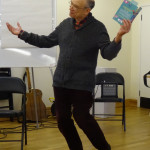Brian Patten’s Ten Most Asked Questions
1 When did you start writing?
I started writing when I was thirteen or fourteen, or maybe somewhere in between. I’m not sure why I began writing. There were very few books in the house. I felt very isolated and lonely as a child, and the adults who surrounded me were not happy, so maybe I began writing as a way of trying to express feelings I could not easily share with them.
2 Where do you get ideas from?
Ideas are all over the place, sometimes I think if ideas were visible the world would be so cluttered we wouldn’t be able to see anything else. Sometimes ideas are sparked off by a rhyme, but I honestly don’t know where they come from. All I know is that as soon as you get one, another comes along, then another, then another… And then they go away for a while, and I think that I’ll never be able to write another poem ever again.
3 Did you always want to be a writer or did you have other ambitions?
I’ve always wanted to be a writer, but I love travel and in the last few years I’ve crossed deserts, been in jungles and up the Andes. I’ve also followed Darwin’s voyage to the Galapagos islands. I suppose being an explorer would have been fantastic a century ago.
4 Do you enjoy writing?
Yes, but sometimes I find it hard to sit down and actually begin new work. For me writing comes in bursts of activity with long stretches of nothing in between. When I’m not writing I forget how much I like it when I am.
5 Do you have any hobbies?
I like gardening and swimming in the sea. I love snorkelling and want to try aqua-diving soon. I’ve been paragliding and that was fun.
6 What was your favourite childhood book?
There was an old lady called Freida who lived in my street when I was a child. Her living room was full of dust and moth-ball-scented books, and I used to go into her house to visit her. She gave me a book of fairy tales and the story of the Little Mermaid (who leaves the ocean to meet the man she loves) was one of the stories in the book. When she leaves the ocean she feels as if she is walking on broken glass. The beauty and cruelty of the story impressed me. It was a tiny book, and I think maybe that book was important because it was my first encounter with the world of wonder and magic.
7 Of all the poems you have written, which is your favourite?
If I told you what my favourite poem is then all the others would get very jealous
8 What is your favourite food?
Thai food mostly, and the kind of food they serve in Southern India, which is my favourite country. Also cornbeef hash.
9 When do you write?
I think my best time is between 4pm and 8pm, when I’ve put things off too long and before I go out for the evening. But if I’m on holiday in a quiet place I get up very early, go for a walk and a swim, then try to write. I always wish I would try harder, because basically I’m very lazy.
10 What advice would you give to children who want to become writers or poets?
To very young children I would not give advice, only encouragement. To older children my advice would be to try to improve what you have written once you’ve written it.
Two poems from Brian’s Juggling With Gerbils
The Day I Got My Finger Stuck Up My Nose
When I got my finger stuck up my nose
I went to a doctor, who said,
“Nothing like this has happened before,
We will have to chop off your head.”
“It’s only my finger stuck up my nose,
It’s only my finger!” I said.
“I see what it is,” the doctor replied,
“But we’ll still have to chop off your head.”
He went to the cabinet and took out an axe.
I watched with considerablr dread.
“But it’s only my finger stuck up my nose.
It’s only a finger!” I said.
“Perhaps we can yank it out with a hook
Tied to some surgical thread.
Maybe we can try that,” he replied
“Rather than chop off your head.”
“I’m never going to pick it again.
I’ve now learned my lesson,” I said.
“I won’t stick my finger up my nose –
I’ll stick it in my ear instead.”
In Tintagel Graveyard
In an ancient cemetery overlooking the sea, I saw fresh flowers that had been placed on the grave of a boy who had drowned more than a century ago.
Who brought flowers to this grave?
I, said the wren.
I brought them as seeds and then
Watched them grow.
No, said the wind. That’s not true.
I blew them across the moor and sea,
I blew them up to the grave’s door.
They were a gift from me.
They came of their own accord,
Said the celandine.
I know best. They’re brothers of mine.
I am Death’s friend,
Said the crow. I ought to know.
I dropped them into the shadow of the leaning stone.
I brought the flowers.
No, said Love,
It was I who brought them,
With the help of the wren’s wing,
With the help of the wind’s breath,
With the help of the celandine and the crow.
It was I who brought them
For the living and the dead to share,
I was the force that put those flowers there.
Brian Patten made his name in the 1960s as one of the Liverpool Poets, alongside Adrian Henri and Roger McGough. Their main aim was to make poetry immediate and accessible for their audience, and their joint anthology, The Mersey Sound (1967), has been credited as the most significant anthology of the twentieth century for its success in bringing poetry to new audiences, and is now a Penguin Modern Classic. Brian is also well-known for his best-selling poetry collections for children, most famously Gargling with Jelly (1985) and Juggling with Gerbils(2000). His collection for children and adults, The Blue and Green Ark: An Alphabet for Planet Earth, won a Cholmondeley Award in 2002. He has also written a novel for children, Mr Moon’s Last Case (1975), which won an award from the Mystery Writers of America Guild.





